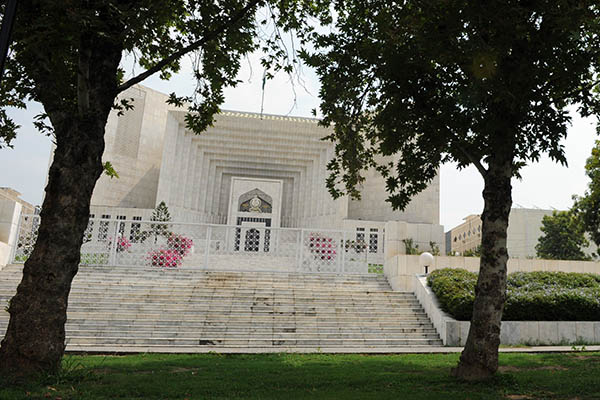
Aamir Qureshi—AFP
Top court warns that if no legislation not enacted within six months, incumbent COAS will have to be replaced
The Supreme Court of Pakistan on Monday issued a detailed verdict on its direction to the federal government to legislate the modalities of the extension of the Chief of Army Staff.
Last month, the apex court issued a short order allowing the government to grant a conditional six-month extension to the tenure of Army chief Gen. Qamar Javed Bajwa. It said that the government would have to legislate, within six months, the modalities of this extension or it would be considered void.
The detailed verdict, penned by Justice Mansoor Ali Shah, goes into more detail, noting that the three-member bench comprising Shah, Chief Justice Asif Saeed Khan Khosa and Justice Mazhar Alam Khan Miankhel, had examined the various laws cited by the government in granting the extensions including Article 243 of the Constitution, the Pakistan Army Act, 1952, and the Pakistan Army Act Rules, 1954.
Summarizing its finds, the court “found that the Pakistan Army Act, 1952 falls deficient of the structural requirements for raising and maintaining an Army under clause (3) of Article 243 of the Constitution.” It said is does not provide the “essential elements” needed to grant “the terms of service of the Commissioned Officers including tenure and extension of a General.” Similarly, it said, “no tenure or age of retirement for the rank of General is provided under the law.” It noted that institutional practice prompted retirement after the completion of three years of service, but this was not “a valid substitute of the law.”
The verdict by Justice Shah also found that there was no legal basis for “extending service of a General for another tenure” and that in the absence of any laws, the summaries of extension approved by the president, the prime minister and the federal cabinet “seem to be meaningless and of no consequence.”
According to the verdict, Regulation 255 of the Army Regulations (Rules) does not grant the federal government authority to grant extension to a general for another full tenure, adding it also appears to be in violation of the Pakistan Army Act, as it assigns the subject of “retirement” under the Rules and not the Regulations.
The verdict noted that the court had approved the conditional extension due to the Attorney General of Pakistan’s assurances that the matter would be legislated within six months and in light of the importance of the responsibilities of the COAS. However, it added, that if Parliament failed to enact legislation within six months, the “tenure of the constitutional post of COAS could not be left totally unregulated and to continue forever,” as it would “amount to a constitutional absurdity.” If this happens, it warned, the “institutional practice of retirement of a General on completion of the tenure of three years as pleaded by the Attorney-General and borne out from the record, shall stand enforced” and the government will have to appoint a new COAS.
In his assenting note, Chief Justice Khosa said he “in our peculiar historical context Chief of the Army Staff holds a powerful position in ways more than one. Unbridled power or position, like unstructured discretion, is dangerous.” He said it was “shocking” that the terms and conditions of service of the Army chief had remained unregulated by any law so far. “In the backdrop of the last three scores and twelve years of our history I may observe with hope and optimism that framing of a law by the Parliament regulating the terms and conditions of the office of Chief of the Army Staff may go a long way in rectifying multiple historical wrongs and in asserting sovereign authority of the chosen representatives of the people besides making exercise of judicial power of the Courts all pervasive.”
He added: “I understand that democratic maturity of our nation has reached a stage where this Court can proclaim that, as declared by Chief Justice Sir Edward Coke of England in the Commendam case in the year 1616 regarding the powers of King James I, ‘Howsoever high you may be; the law is above you’.”
